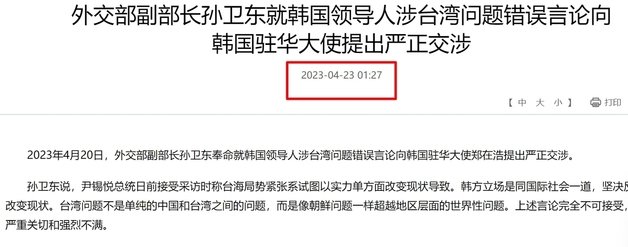Since President Yoon Seok-yeol’s remarks about the ‘Taiwan Strait’ during an interview with foreign media last week, the atmosphere of conflict between Korea and China continues.
In particular, at the Korea-US summit between President Yun and US President Joe Biden, which will be held on the 26th (local time), it is expected that matters regarding cross-strait conflicts (China and Taiwan) will be discussed in relation to current issues in the region, There are also concerns that ‘uncomfortable’ relationships can continue for a considerable period of time.
According to multiple government sources on the 24th, if Taiwan-related content is included in the joint statement to be derived from the Korea-US summit, it is highly likely that it will be at a similar level to last year’s summit.
In a joint statement adopted after the first meeting held in Seoul in May of last year, President Yoon and President Biden said, “We emphasized the importance of maintaining peace and stability in the Taiwan Strait as a key factor in security and prosperity in the Indo-Pacific region.”
Later, at the Korea-US-Japan summit with President Biden and Japanese Prime Minister Fumio Kishida held in Phnom Penh, Cambodia in November of the same year, President Yoon emphasized that “there is no change in the basic position related to Taiwan, and is concerned with the security and prosperity of the international community.” We reaffirm the importance of maintaining peace and stability in the Taiwan Strait as an essential element.”
However, according to the principle of so-called “one China” (一個中國, mainland China and Hong Kong, Macau, and Taiwan are indivisible, and the legal government is only one “People’s Republic of China”), other countries, including the United States, Taiwan Mentioning related issues itself has been regarded as ‘interference in internal affairs’ and has reacted sensitively.
In this regard, one of the reasons why the Chinese authorities expressed strong dissatisfaction with President Yoon’s reference to Taiwan during an interview with Reuters reported on the 19th of this month was that “they did not express their position to respect the ‘one China’ principle.” came out
In this Reuters interview, President Yoon said that the tension between the two countries was caused by “attempts to change the status quo by force,” and that “the Taiwan issue is not simply an issue between China and Taiwan, but a global issue just like the North Korean issue.” done.
After the interview with President Yoon, the South Korean government, through Ministry of Foreign Affairs officials, issued positions such as “The Korean government respects ‘one China’” and “President Yoon’s remarks were referring to the universal principle of the international community.” The ‘offensive’ continued through Foreign Minister Wang Wenbin (汪文斌), Foreign Minister Sun Weidong (孫衛東), and Foreign Minister Qin Gang (秦剛), and the level increased accordingly.
In particular, Chin even said in a forum on the 21st, “Those who play with fire over the Taiwan issue will surely burn to death.”
 Early in the morning of the 23rd, the Ministry of Foreign Affairs of China released the contents of the phone call between Vice Foreign Minister Sun Weidung and Ambassador to China Jeong Jae-ho on the 20th on its homepage.
Early in the morning of the 23rd, the Ministry of Foreign Affairs of China released the contents of the phone call between Vice Foreign Minister Sun Weidung and Ambassador to China Jeong Jae-ho on the 20th on its homepage.The expression’playing with fire’ is an expression used by Chinese President Xi Jinping in relation to a phone call with President Biden in July of last year and a visit to Taiwan by then-US House Speaker Nancy Pelosi in August of the same year.
For this reason, there have been observations that the Chinese side’s opposition to President Yoon’s recent interview reflects President Xi’s intentions, and interpretations that it is simultaneously targeting both sides of the US and South Korea ahead of the summit.
It is known that the South Korean side judged that the Chinese side had sufficiently exchanged the positions of each country through diplomatic channels for two days on the 20th and 21st, and hoped that the situation would be ‘ended’ through this. As Vice President Sun’s protest phone was published on the website, the wave continued.
In particular, the state-run Global Times and Global Times, which represent the position of the Chinese authorities, also published editorials on the same day openly criticizing the contents of the interview with President Yoon, saying, “The national dignity of Korean diplomacy has been shattered.”
In response, the Korean Ministry of Foreign Affairs also reiterated that during a phone call with Vice Minister Sun late on the afternoon of the 23rd, Ambassador Jeong “conveyed the clear position of the Korean government,” such as △ monitoring the escalating tension in the Taiwan Strait and △ respecting ‘one China’. In particular, the Korean Ministry of Foreign Affairs criticized Chinese media reports, such as the Global Times, as “a malicious article that will further alienate China from the international community.”
Yang Gap-yong, senior researcher at the Institute for National Security Strategy, said, “The Ministry of Foreign Affairs of the Republic of Korea has not responded to the strong claims of the Chinese state media.” Because there is a nerve war going on. We couldn’t just sit still,” he diagnosed.
Yang said, “It is highly likely that this atmosphere will continue until the G7 summit next month after the Korea-US summit. did.
G7 leaders, including the United States and Japan, are expected to discuss pending issues in the region, including Taiwan-related issues, at a summit meeting to be held in Hiroshima, Japan, from the 19th to the 21st of next month. Following the Korea-US summit, President Yoon will also attend the G7 summit.
Source: Donga
Mark Jones is a world traveler and journalist for News Rebeat. With a curious mind and a love of adventure, Mark brings a unique perspective to the latest global events and provides in-depth and thought-provoking coverage of the world at large.